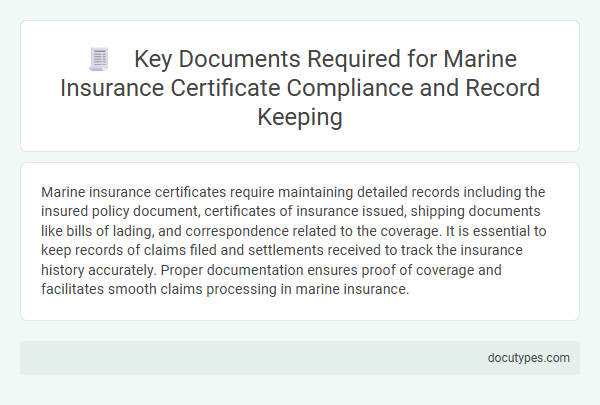Marine insurance certificates require maintaining detailed records including the insured policy document, certificates of insurance issued, shipping documents like bills of lading, and correspondence related to the coverage. It is essential to keep records of claims filed and settlements received to track the insurance history accurately. Proper documentation ensures proof of coverage and facilitates smooth claims processing in marine insurance.
Introduction to Marine Insurance Certificate Compliance
What records should be maintained for marine insurance certificates to ensure compliance? Proper documentation of marine insurance certificates is crucial for verifying coverage and facilitating claims processing. These records help demonstrate adherence to regulatory requirements and provide evidence in case of disputes or audits.
Importance of Accurate Documentation in Marine Insurance
Accurate documentation is crucial for marine insurance to ensure smooth claims processing and risk management. Maintaining detailed records of marine insurance certificates protects your interests and supports compliance with legal requirements.
- Policy Details - Retain copies of the insurance certificate to verify coverage terms and conditions during claims or disputes.
- Shipment Records - Keep bills of lading, invoices, and cargo manifests to validate the insured goods and their value.
- Claims Documentation - Store all correspondence, loss reports, and settlement records to facilitate efficient claim resolution and future risk assessment.
Essential Proposal and Application Forms
| Record Type | Description | Importance |
|---|---|---|
| Essential Proposal Forms | Documents outlining coverage requests, including details about cargo, vessel, voyage, and insurance limits. | Serves as the foundational basis for underwriting and assessing risk associated with the marine insurance policy. |
| Application Forms | Completed forms that include the insured party's information, specification of insurance requirements, and any declarations or warranties. | Ensures accurate underwriting and policy issuance, helping in claims processing and verification. |
| Supporting Documentation | Additional documents such as ship registration certificates, previous claims history, and inspection reports. | Validates the information provided and reduces potential disputes during claims. |
| Policy Endorsements | Records of any amendments or changes made to the original insurance contract post-issuance. | Maintains an up-to-date record of coverage terms and conditions for reference during claims or audits. |
| Communications | Correspondence between the insured, insurer, and agents related to the insurance application and coverage terms. | Documents the decision-making process and agreements made regarding your marine insurance policy. |
Valid Marine Insurance Policy Documents
Maintaining valid marine insurance policy documents is essential for ensuring comprehensive coverage of your maritime assets. These records provide proof of insurance and outline the terms, coverage limits, and parties involved in the policy.
You should keep original certificates, endorsements, and renewal notices in an easily accessible location. Accurate record-keeping helps in prompt claims processing and compliance with legal and regulatory requirements.
Bill of Lading and Shipping Invoices
Maintaining accurate records for marine insurance certificates is essential to ensure smooth claims processing. Key documents include the Bill of Lading and Shipping Invoices, which serve as proof of shipment and ownership.
The Bill of Lading details the cargo description, shipment date, and consignee information, making it vital for verifying coverage scope. Shipping Invoices provide a record of the goods' value, helping assess the insured amount. Keeping these documents organized and readily accessible enhances your ability to validate claims promptly and avoid disputes.
Certificate of Origin and Packing List
Maintaining accurate records for marine insurance certificates is crucial to ensure seamless claims processing and risk assessment. Key documents include the Certificate of Origin, which verifies the shipment's manufacturing location, and the Packing List, detailing the contents and packaging of the cargo.
The Certificate of Origin authenticates the origin of goods, aiding in customs clearance and compliance with trade agreements. The Packing List provides precise information about item quantities, weights, and dimensions, essential for verifying shipment accuracy and assessing potential damage claims.
Survey and Inspection Reports
Marine insurance certificates require detailed records to ensure coverage validity and risk assessment accuracy. Survey and inspection reports document the vessel's condition, cargo integrity, and compliance with safety regulations, serving as critical evidence in claims processing. You should store these reports securely to support claims and maintain transparency with insurers.
Claims Documentation and Evidence
Maintaining comprehensive claims documentation is essential for marine insurance certificates to ensure smooth processing and verification. You should keep copies of the original insurance policy, detailed loss reports, and correspondence related to the claim. Supporting evidence such as inspection reports, photographs of damaged goods, and shipping documents must also be preserved for accurate claim validation.
Record Retention Policies and Legal Requirements
Maintaining accurate records for marine insurance certificates is crucial for compliance with legal requirements and efficient claims processing. You should implement robust record retention policies to safeguard these documents for the appropriate duration.
- Retention Duration - Marine insurance certificates and related documents must typically be retained for a minimum of six years, aligning with statutory limitation periods in many jurisdictions.
- Compliance with Regulations - Records should comply with international maritime law and local insurance regulations to ensure validity and accessibility during audits or legal disputes.
- Secure Storage - Maintaining both physical and digital copies in secure environments protects against loss, damage, or unauthorized access, preserving the integrity of marine insurance documentation.
What Records Should Be Maintained for Marine Insurance Certificates? Infographic

